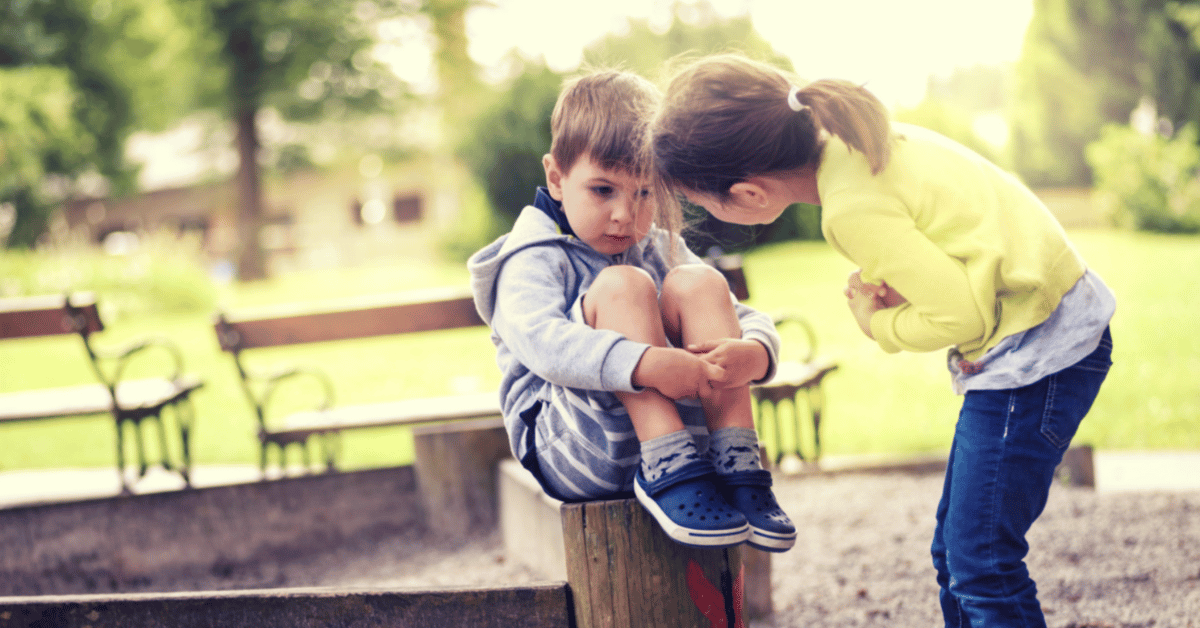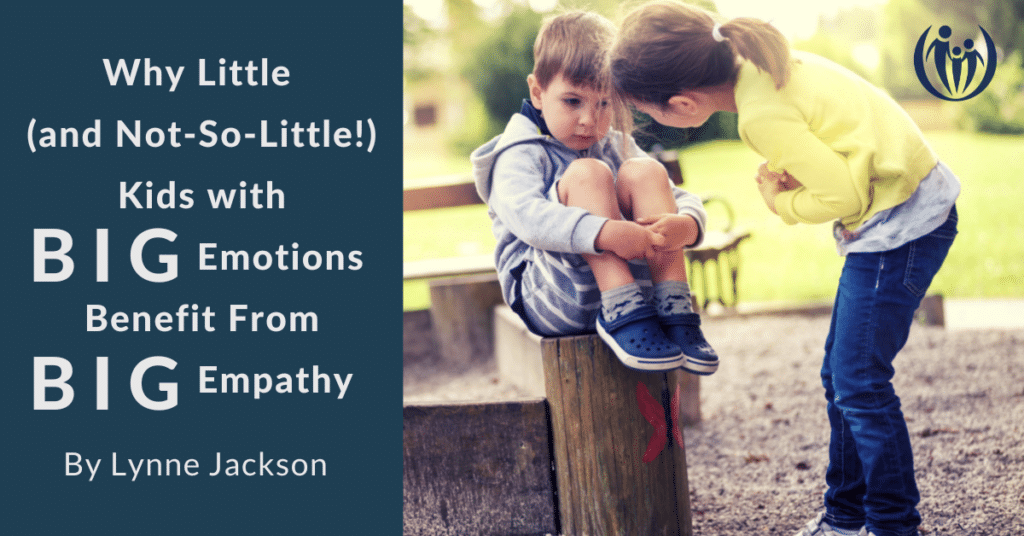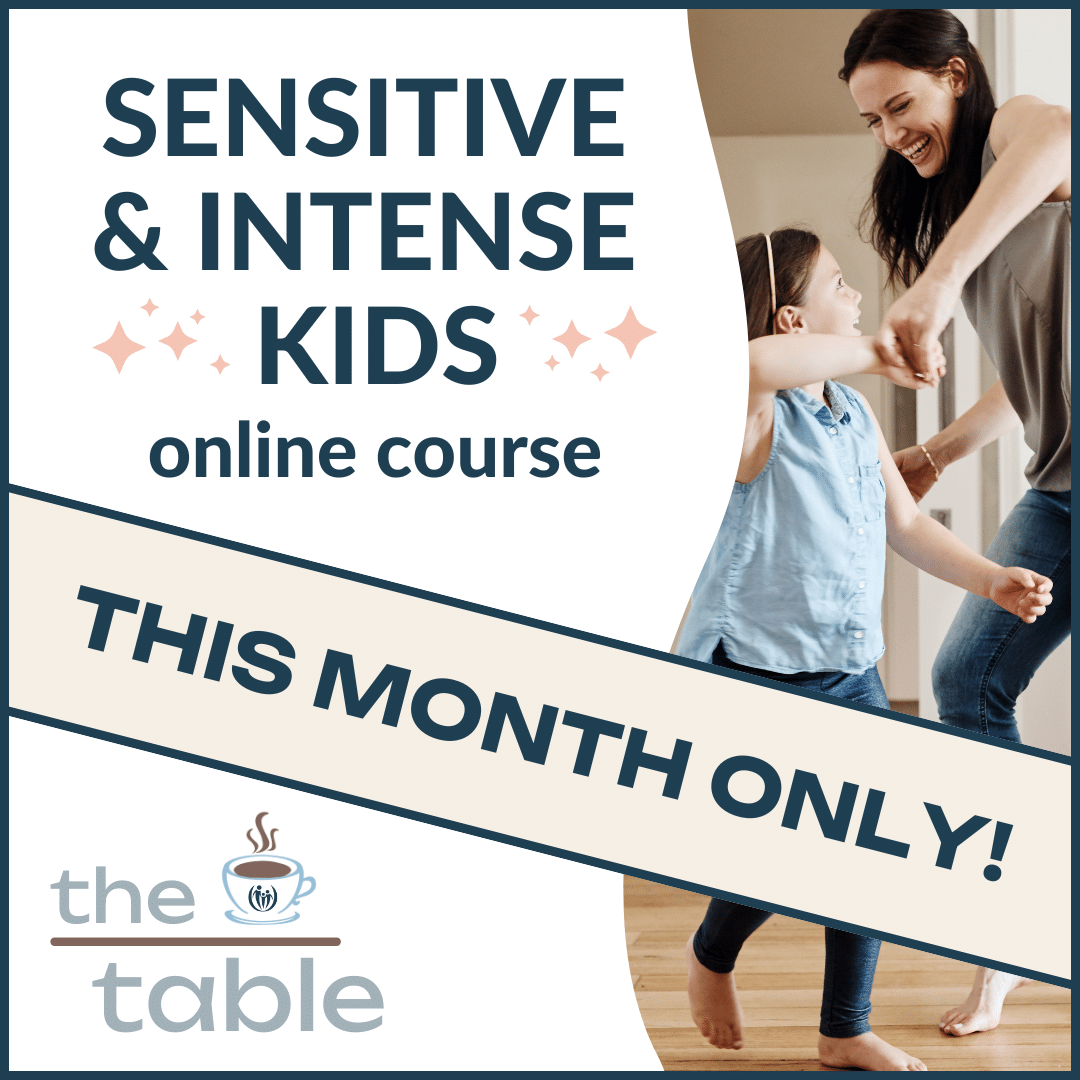
Why Little (And Not-So-Little) Kids With Big Emotions Benefit From Big Empathy

Got a child with big emotions? Toddlers and teens are known for their explosions of big feelings, but many kids simply “feel deeply” all their lives. Sometimes it seems those kids totally lose it at inopportune moments. It can even feel like your child’s big uncontrolled emotions are starting to control your family’s interactions. So what do you do?
While there’s not a simple fix, there’s an important principle to embrace: There is no more important time for kids to know they are loved than when they misbehave. If the love message misses them in that moment, they will grow to believe that love is conditional or earned. People who believe that love is earned tend to rise and fall with their performance and compromise themselves for approval. Not what you want for your kids.
Showing love when your child’s big emotions are challenging
One way children know they’re loved is if you simply say so, not in a condescending way, but from your heart, right there while your kids are misbehaving. (If this sounds challenging or counterintuitive, we encourage you to try it.) Another powerful way to express love is by expressing understanding, or empathy.
Empathy is about putting ourselves in our kids’ shoes and feeling what it’s like to be them. This is good for both parents and kids. Taking a step back to pause and think about how a child is feeling will also help settle a parent down. It is impossible to be simultaneously angry and genuinely empathetic.
We have a podcast about this!
Check out “In Your Child’s Shoes: Why Is Empathy Important?” to hear more practical ideas that will empower and equip you to navigate those big emotions with empathy.
Mirror and name your child’s feelings
Once you identify your child’s emotions, you can become a mirror and simply tell them what you see. You can do this by using words that describe their big feelings and how they seem to be showing them. This shows that you understand and aren’t intimidated by their outsized emotions, and it also gives your child language so they can describe their feelings in the future. “You seem kind of sad!” or, “Your fists are clenched, and your face looks really angry! Is that right?”
It helps the child know you get what it’s like to be them while still giving them the ultimate right to determine their feelings. But more significantly, beneath this simple act are powerful messages of love. “I understand you! You are not alone! I am for you.”
Communicating these messages doesn’t mean the child is now “off the hook,” but that you are with them and for them in the struggle, not against them. As children feel understood, if consequences are still needed, they are much more receptive to them because they know, “You are LOVED no matter what!” And sometimes, as a bonus, just by empathizing, parents influence their children to self-correct their misbehavior.
How Amy took the edge off of her daughter’s big feelings
Amy, the mom of a three-year-old, told us the following story and then sent us a “reality show” video [click to watch] of the impact of her empathy.
Lizzie was distraught when she spilled on her favorite stuffed bunny and it had to be laundered. She screamed as Amy put the bunny into the front-loading washing machine with the rest of the clothes. At first, Amy tried to set firm boundaries, “This is not okay! You need to learn to get over it when things don’t go the way you want!” But her reminders seemed to fall on deaf ears as the bunny spun and spun in front of an increasingly distressed Lizzie. As the tantrum escalated, Amy remembered the simple idea – kids often need empathy before they can settle themselves from a tantrum.
She took time to calm herself first
Amy prioritized taking a moment to settle down herself. She realized it was okay for Lizzie to scream unattended for a bit so she could breathe and calm down.
Then she could sincerely empathize and connect
A little bit later, she returned to her still-screaming daughter, got down on her level, and emphatically described what was important to her child, “You really want your bunny, don’t you? You really want her!” Lizzie continued crying, but immediately the edge went out of her wails. Amy continued, “You love that bunny, don’t you? Do you need a hug?” Lizzie climbed onto Amy’s lap.
Overwhelming big feelings moved into helpful action
Now Amy joined Lizzie in her sadness instead of suppressing it. She didn’t open the washing machine to give Lizzie the bunny — she just took the conflict out of the interaction by empathizing. In just a few short moments, what was originally a power struggle over a tantrum became a valuable teaching moment that ended with Lizzie learning to empty the washing machine and start the load in the dryer. True “discipline that connects!”
In this instance, Amy’s empathy calmed Lizzie’s big emotions and empowered her to help with the dryer.
Life was more peaceful for both of them that day, and more importantly, Lizzie felt loved even in her misbehavior. As Amy persists in expressing empathy to Lizzie in a variety of situations and emotions, she’ll accomplish a lot more than just calming meltdowns.
FREE! 20 Empathy Statements
Want a quick reminder during the messes of daily life? This FREE downloadable PDF can be printed and put anywhere for some quick encouragement and ideas for what to say in those challenging moments.
5 valuable outcomes from empathizing with those big emotions
A longer-term look (adapted from the work of Dr. John Gottman) shows that as parents empathize and build their child’s ability to identify their feelings, this develops five powerful strengths:
- Self-awareness – I recognize and understand my own emotions
- Self-regulation – I calm and redirect my disruptive emotions and impulses
- Empathy – I understand and value other people’s feelings
- Social skills – I utilize insight for healthy relationships
- Motivation – I achieve because I know what’s important to me
So when your child has big, uncontrolled emotions, why not try empathizing with their feelings? It’ll help you react more calmly, help your kids build emotional maturity, and, most importantly, communicate to kids that they are loved unconditionally, no matter what!
Apply It Now:
- When was a time when you helped your upset child identify their emotions or articulate what was really important?
- What was the result?
- How might you do that more often?
This resource was made possible by members of The Table, whose monthly support creates a ripple effect of change for generations to come. We’d love to have you take a seat at The Table!
© 2013, 2025 Connected Families

SPECIAL MARCH OFFER EXTENDED THROUGH FRIDAY APRIL 4TH!
Join The Table at a suggested donation of $35 a month in March and enjoy FREE access to our popular Sensitive & Intense Kids online course PLUS a free enrollment to share with another family.

